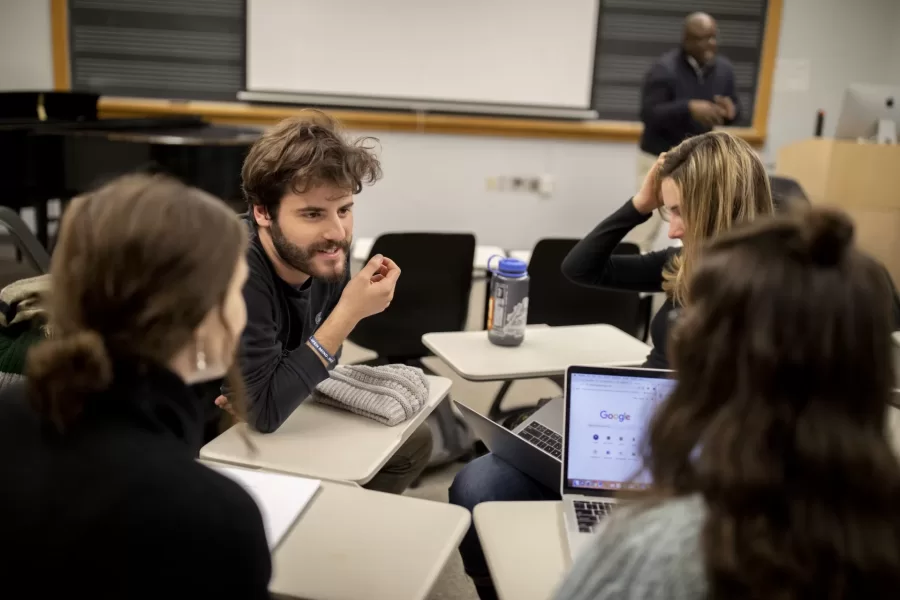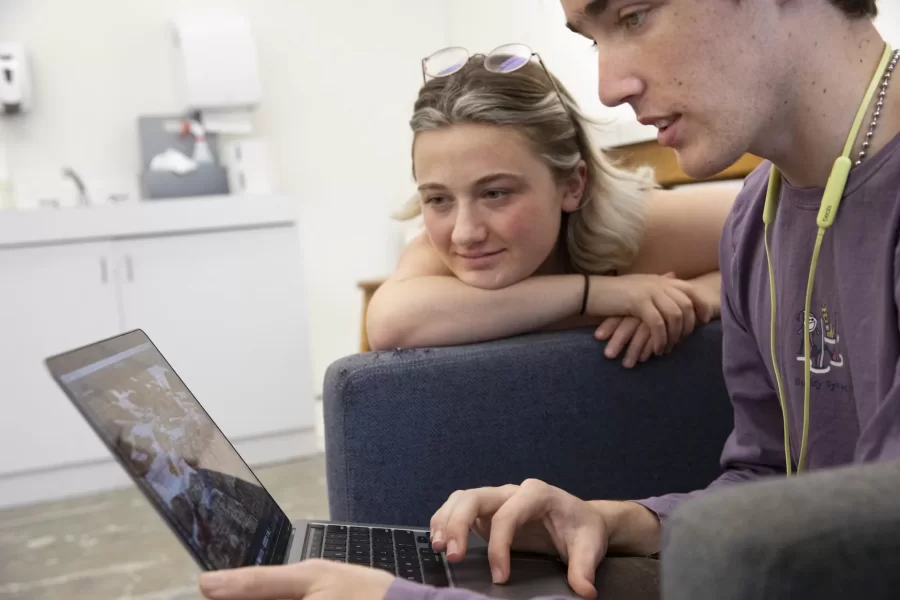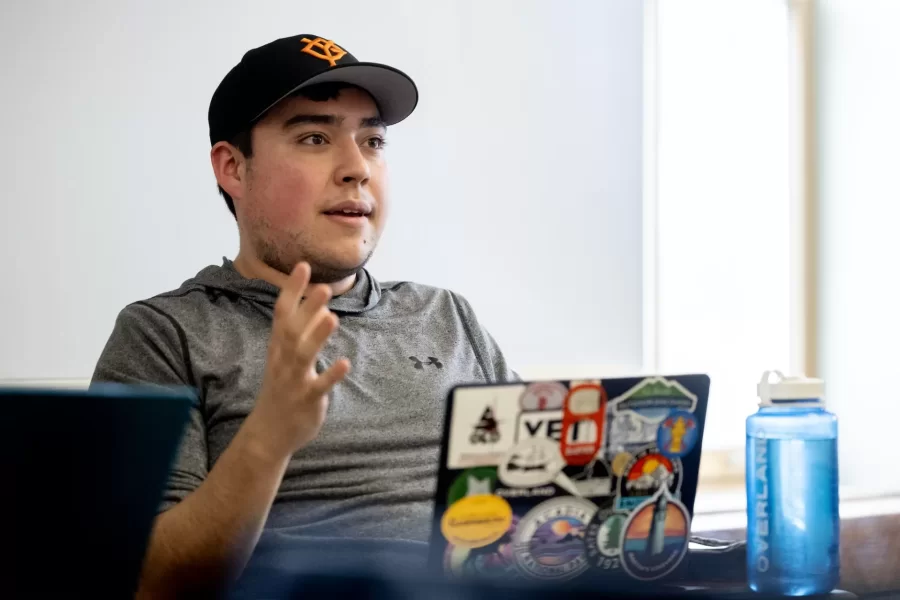What does it mean to be “an American?” How does our understanding of American culture, and our relation to it, differ depending on historical context, social position, and the interpretive and ideological perspectives we bring to bear? American Studies pursues these questions using a variety of interdisciplinary approaches, texts, performance, and material culture as points of departure for a wide-ranging exploration of American culture.
Statement of Continued Commitment
We, the program of American Studies, want to affirm our commitment to combating systematic racism. We reject racist structures and actions through our departmental culture and practices, curricula, and pedagogies. We stand firm in our commitment to the liberal arts as a liberatory and emancipatory education that should be used to critically engage in the world, relying on decolonizing frameworks to dismantle systematic oppressive structures. We recommit to creating a safe and equitable space for learning for our students, faculty, and staff.
- We affirm that Black Lives Matter, Latinx lives matter, Indigenous lives Matter, non-Black People of Colors lives Matter. We understand that silence is not an option.
- We commit to continuing to teach about American/U.S. Cultural politics in a global context that we must analyze and expose anti-Blackness and other forms of racial oppression. The history of American Studies has been to decenter whiteness as a starting point for understanding the world. American Studies at Bates will continue this with an emphasis on transdisciplinarity. We welcome all students, faculty and staff to stand, sit, or kneel in solidarity with us.
- We believe our curricula must reflect the realities of our students, our communities, and our world.
- We commit to analyzing and combating racist practices as a program – culturally, socially, linguistically, academically, and professionally – in our teaching, writing, research, and work-spaces for students, staff, faculty and in our lived experiences outside of the institution.
American Studies
What does it mean to be “an American?” How does our understanding of American culture and our relation to it differ depending upon historical context, social position, and the interpretive and ideological perspectives we bring to bear upon it? American Studies pursues these questions using a variety of interdisciplinary approaches, using texts, performance, and material culture as points of departure for our wide-ranging exploration of American culture. While it focuses on the United States, American Studies situates the U.S. in a broader transnational context. In particular, American Studies explores the various ways that institutions, values, and practices shape, maintain, and challenge power relations. American Studies courses are designed to elucidate what has been rendered socially invisible.
Such discussions interrogate realities and discourses that have been deemed natural in order to expose their socially contingent character. Through their critical engagement with race, gender, sexuality, social class, disability, and other sites of identity, and with their own relation to them, students interrogate the meaning of belonging, privilege, and exclusion. Among current American Studies courses are those that focus on cultural geography and cultural politics, science studies, borderlands, diasporas, film and media, gender, history, literature, music, performance, digital and technology studies, queer theory, and race theory.

Afro-Cuban Hiphop artist Pablo D. Herrera Veitia led a workshop yesterday titled ìLet’s Talk About Cultural Production, Franklyî with Bates students in Olin Arts Center 128.
.
Herrera Veitia has managed urban musicians and music-related projects in Cuba for more than 20 years. He is considered Cuba’s most influential beat-maker and a pioneer of the Cuban Hiphop sound, which is highly influenced by Afro-Cuban music and culture. He is a 2018-19 Nasir Jones Fellow Hutchins Center for African African American Research, Harvard University, and a doctoral candidate in social anthropology, University of St Andrews, Scotland.
.
During the workshop, Herrera Veitia discussed how he has engaged in cultural production in and outside of Cuba and asked students to consider ìWhat motivates us to be cultural producers?î The participants broke into small groups to propose hypothetical cultural productions and the roles they might play in them. He then asked the each student to share their individual identities ó their passions ó as cultural producers. Cultural production, he pointed out, can be ó but is not exclusively ómusic or theater or film. îAs active citizens, weíre all doing culture in our own way,î he said.
.
Herrera Veitia will offer the same workshop on Thursday, Feb 28 at 4:15pm in Olin 128. and Friday, March 1 at 4:15 in a TBD location. For more information, call 207-786-6135 or olinarts@bates.edu. His visit to Bates was sponsored by the Latin American Studies Program, the Department of Music, and an NEH Learning Associates Grant.
Luis Da Molina (preferred) but in directory, it’s
Luis David Molina Rueda and Reilly Dwight.

Art and visual culture majors with a studio concentration work in their first-floor Olin Arts Concert Hall studios in preparation for the Annual Senior Exhibition that will open in April at the Bates College Museum of Art.
Emily Graumann ’22 (in gray sweater) of Salem, a double major in AVC and English, is producing a thesis in hand-drawn animation.
Ollie Penner ’22 (purple shirt) of Pasadena, Calif,, is a double major in AVC and American Studies, whose thesis uses photography and Photoshop.
Kathy Boehm ’22 (black sweater) of Denver, Colo., is a double major in AVC and American studies, who’s designing town with drawings and mixed media.
Mary Richardson ’22 (black tank top) of Blue Hill, Maine, is a double major in AVC and psychology and exploring themes of growing up and bodily image. She’s using mixed media and colored pen.

Students in Associate Professor of Hispanic Studies Stephanie Pridgeon’s “Screening Citizenship: Jewish Latin American Film” class prepare for two upcoming presentations they will make at the upcoming
Maine Jewish Film Festival, both in Portland and Bates. One film is called “Torah Tropical” (see below) and the other, made in Argentina and Austria, is called “The Klezmer Project).
Pridgeon says:
This coming Tuesday, March 4 at 7 PM in Olin, we will be screening the beautiful documentary “Torah Tropical” followed by a Q + A with producer Heidi Paster (parent of a current Bates student) led by students from my Jewish Latin American film seminar. The documentary follows the story of a family in Cali, Colombia, who converts to Judaism and attempts to immigrate to Israel. Please join us if you’re interested and please also consider passing along the information to your students, colleagues, and friends if they might also be interested (entry is free for Bates staff, faculty, and students!)
This course considers films from throughout Latin America made by Jewish directors. Students learn the history of Latin American film production as well as terms and skills necessary for audiovisual analysis. The course examines the ways in which film is used as a vehicle to explore and represent issues of identity, belonging, immigration, and assimilation that have long characterized Jewish experiences in Latin America. Moreover, the course focuses on filmmakers’ engagement with key social and political issues within their respective countries as well as on a regional or global scale. Taught in Spanish. Recommended background: HISP 228. Prerequisite(s): HISP 210 or 211.


